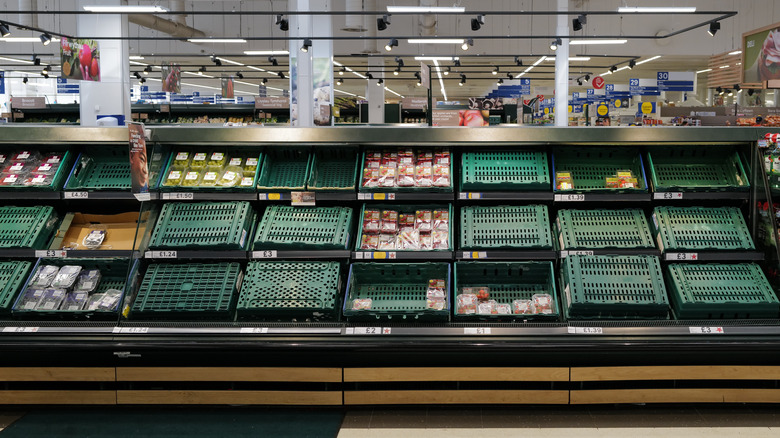UK Grocery Stores Are Rationing Shoppers' Produce Amidst Shortage
If you go grocery shopping in the U.K. seeking provisions for a vegetarian feast, don't expect to come away with enough to feed a large crowd. As of this week, Tesco and Aldi joined fellow retailers Morrisons and Asda in issuing shopping limits on certain produce items.
At Morrisons, each customer is allotted no more than two packs of tomatoes, peppers, cucumbers, and lettuce bunches. At Asda, shoppers are limited to no more than three items of broccoli, cauliflower, raspberries, and lettuce. And at Aldi and Tesco, there's a three-per-person limit on peppers, cucumbers, and tomatoes. Retailers told The Guardian that customers can expect rationing to continue for "some weeks" as food shortages persist.
The restrictions might remind some of the British government-sanctioned food rationing programs that swept England in the 1940s, during World War II. Like the current shopping limits at the country's biggest supermarkets, the plan was a means of ensuring an equal amount of goods were available to customers amid shortages. In this case, the shortages are due primarily to a warming climate.
Shoppers are paying the price for droughts in England
England was hit hard by extreme droughts in the summer of 2022 — the worst it's seen in over 500 years. As a result, essential crops like potatoes, carrots, and onions were dangerously low come harvest season. One Yorkshire farmer told CNBC that he'd never seen such dire conditions in his 30 years on the job. While Augusts in Yorkshire usually get an average of 70 millimeters of rain, a scant six millimeters hit the ground in August 2022.
Shoppers are now paying for those droughts in the new year. When you go to a U.K. grocery store like Tesco, you might see a sign that says a product is out of stock due to "adverse weather conditions." The rationing plans implemented by the chain and its competitors are one way of keeping products on the shelves a little longer. "We'd ask all our customers to please shop responsibly so we can help make sure there is enough to go around," reads another sign in front of packaged romaine.
To make matters worse, bad weather in England isn't the only culprit for the shortages. Droughts have also limited the availability of the U.K.'s imported produce.
Countries like Spain Morocco are also struggling
Apples, Brussels sprouts, and cabbage are among the crops that (typically) grow in the U.K. during the winter months. The country turns to places like Southern Spain, Morocco, Tunisia, and Egypt in the colder seasons for imports of things like salad greens and tomatoes. But just like England, those countries are seeing fewer crops than usual due to the summer's unprecedented droughts, as well as diseases like the tomato brown rugose fruit virus, which has been rampant in Spain and throughout Europe in recent months.
It gets worse. Due to the current U.K. energy crisis, which Scottish Power CEO Keith Anderson tells CNN is "bigger than the pandemic," English farmers are also having to cut back on the number of crops they're planting this winter, which could exacerbate shortages further into the year. For now, shoppers across the pond should get used to supermarket produce rations.


